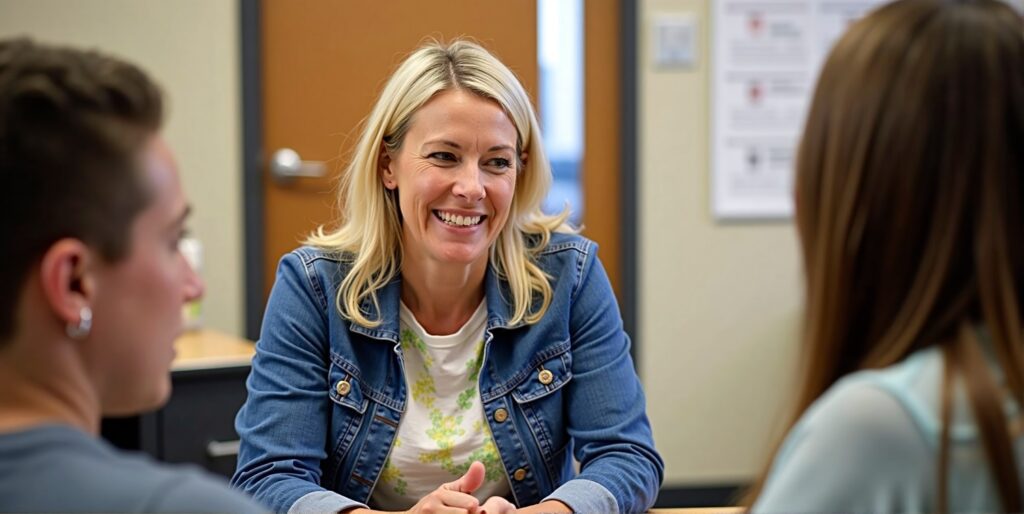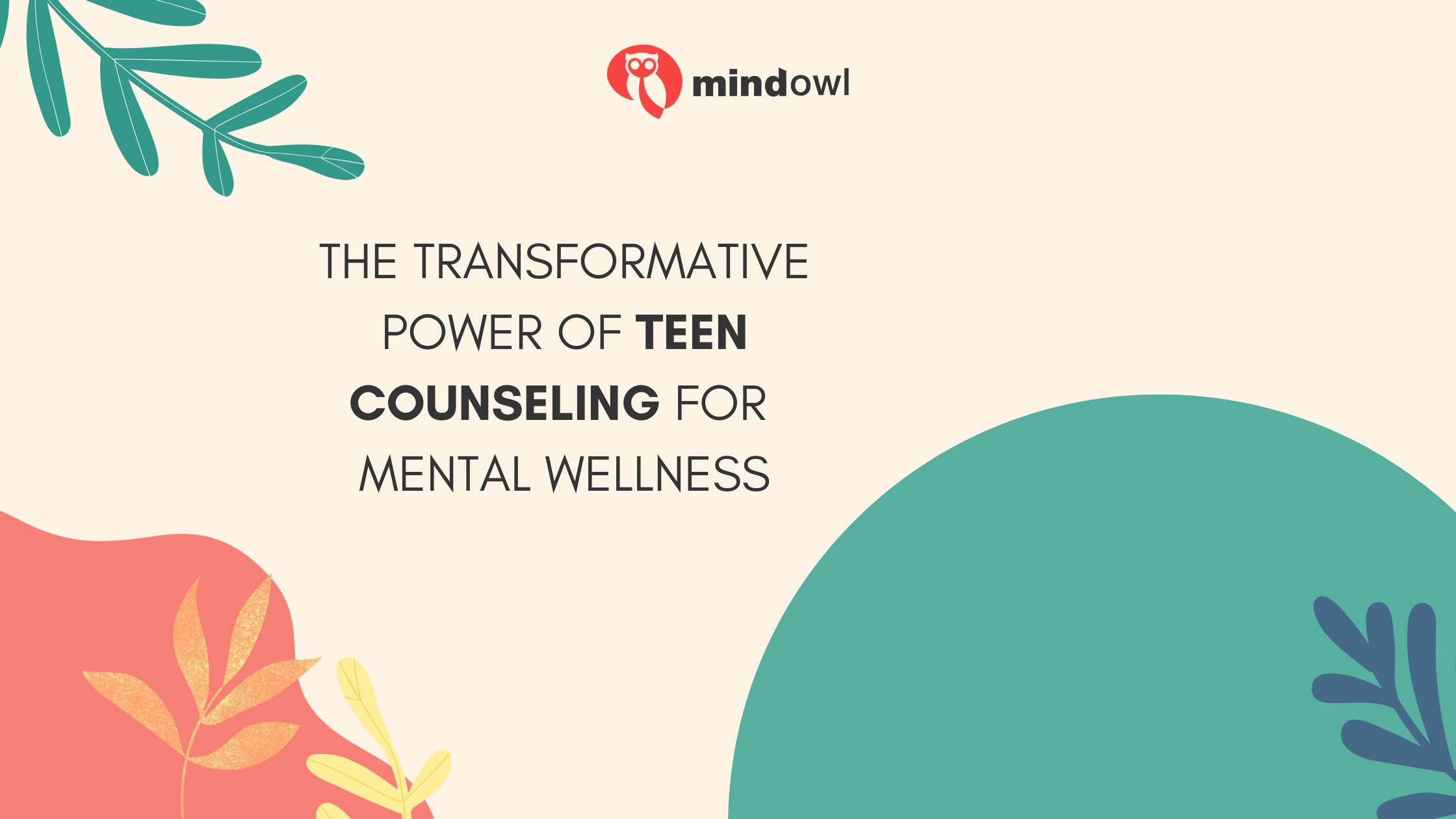
Key Takeaways:
- Counseling equips teens with tools to manage stress, emotions, and decision-making effectively.
- Therapy fosters self-awareness, resilience, and improved interpersonal skills for lifelong well-being.
- Common teen issues, like anxiety and family dynamics, can be addressed through tailored counseling strategies.
- A supportive system, including open communication and peer connections, enhances the impact of counseling.
Teen years are often marked by profound changes—physically, emotionally, and socially. These years bring about new challenges that can feel overwhelming for many adolescents. From academic pressures to shifting relationships, teens encounter stressors that can significantly impact their mental health. Counseling offers a structured way to address these challenges, fostering resilience and mental wellness.
Why Mental Health Matters During Adolescence
The teenage years are a formative period. The brain is still developing, and experiences during this time can shape behaviors and emotional responses well into adulthood. Challenges like social anxiety, academic pressure, bullying, or family discord can make this stage particularly stressful. Without proper support, these issues can lead to lasting mental health concerns, such as depression, anxiety disorders, or behavioral issues.
Counseling acts as a bridge between the challenges teens face and the coping mechanisms they need to thrive. Engaging with professional support allows teens to process their experiences and develop the tools necessary for emotional well-being.
Common Issues Teens Face and How Counseling Helps
Counseling addresses a broad spectrum of concerns. Below are some of the most common issues teens experience, along with how therapy can provide meaningful support:
Academic Stress
Academic performance is a major source of stress for teens. With standardized tests, extracurricular demands, and future career considerations, the pressure to excel can feel unrelenting. Therapy provides a space to untangle these stresses and explore practical coping strategies. For instance, a therapist might help a teen identify manageable study routines, build time-management skills, or explore why academic performance has become such a central stressor.
Social Pressures and Peer Relationships
Navigating friendships, fitting in, and dealing with peer conflict can be tough. Teens often feel isolated when these relationships falter. Counseling offers a neutral environment to explore these issues. For example, by working with experienced counselors in Portland, teens can learn communication skills to improve friendships and manage disagreements. The process also helps them understand how to set healthy boundaries in their relationships.
Family Dynamics
Teen years often coincide with evolving family relationships. Shifting dynamics, misunderstandings, or parental conflicts can make the home environment tense. Counseling allows teens and their families to voice concerns and find solutions that work for everyone. Therapists may use family sessions to improve communication and foster understanding between parents and teens.
Emotional and Mental Health Challenges
Depression, anxiety, and mood swings are common during adolescence. Left unaddressed, these issues can escalate. A counselor’s role here isn’t just to listen—they equip teens with tools like cognitive-behavioral techniques or mindfulness practices. These tools can make a significant difference in managing overwhelming feelings.
Identity and Self-Esteem Issues
Adolescence is a time of self-discovery, but for many teens, this process can lead to confusion and insecurity. They may struggle with questions about their identity, including personal values, beliefs, or sexual orientation. Low self-esteem can also develop as a result of societal pressures or negative self-perceptions. Counseling provides a supportive space where teens can explore these feelings without judgment, fostering a stronger sense of self and confidence.
Substance Use and Risky Behaviors
Some teens experiment with substances or engage in risky behaviors as a way to cope with stress or peer pressure. While not all experimentation leads to long-term issues, these behaviors can be warning signs of deeper struggles. Counseling helps teens uncover the root causes of these actions and teaches them healthier coping strategies, reducing the likelihood of future harm.
The Role of Counseling in Building Emotional Resilience
One of the most valuable outcomes of counseling is the development of emotional resilience. Resilience isn’t about avoiding challenges; it’s about managing them effectively. Here’s how counseling fosters this skill:
Developing Healthy Coping Mechanisms
Rather than resorting to unhealthy habits like avoidance or aggression, therapy encourages teens to face their problems constructively. Techniques such as journaling, mindfulness, or even physical activities like yoga can help them process emotions more effectively. Therapists guide teens to identify what works best for them, creating personalized strategies for stress relief.
Encouraging Self-Awareness
Self-awareness allows teens to understand their triggers and emotional responses. Counseling encourages reflection through exercises like thought tracking. For instance, if a teen feels anxious before public speaking, the therapist might help them trace that anxiety back to specific thoughts, enabling the teen to challenge and reframe those ideas.
Promoting Positive Decision-Making
Teens often face high-stakes decisions. Whether it’s about friendships, academics, or future plans, counseling helps them weigh their options and consider the consequences of their choices. This kind of structured thinking builds confidence and reduces impulsive behaviors.
Building a Growth Mindset
Counseling helps teens shift from a fixed mindset to a growth mindset, where challenges are seen as opportunities to learn rather than insurmountable barriers. Therapists work with teens to reframe their thinking, focusing on effort and perseverance rather than immediate success. This perspective fosters resilience and adaptability in the face of setbacks.
Enhancing Interpersonal Skills
Strong interpersonal skills are vital for navigating relationships and building supportive networks. Counseling equips teens with communication techniques and empathy-building exercises that improve their interactions with peers, family, and authority figures. These skills not only benefit their current relationships but also prepare them for future personal and professional settings.
How to Identify If a Teen Could Benefit From Counseling
Parents and guardians may wonder when it’s time to seek professional support. Here are some signs that counseling might be beneficial:
- Frequent mood changes: Persistent irritability, sadness, or withdrawal from social interactions.
- Decline in academic performance: Struggling with focus, failing grades, or a noticeable drop in enthusiasm for school.
- Changes in behavior: Sudden defiance, aggression, or risk-taking behaviors.
- Physical symptoms: Unexplained headaches, stomachaches, or other signs of stress.
- Expressions of hopelessness: Statements like ‘I can’t do anything right’ or ‘What’s the point?’
If any of these signs are present, reaching out to a counselor can help determine the root cause and set the teen on a path toward wellness.
Practical Steps to Start Teen Counseling
Starting the counseling process can feel overwhelming, but breaking it down into steps makes it more manageable. These steps help set the stage for meaningful and productive therapy.
Choosing the Right Counselor
Finding the right counselor is a key part of the process. Teens are more likely to engage if they feel comfortable with their therapist. Look for someone who specializes in adolescent mental health and has experience addressing the specific issues your teen is facing. Don’t hesitate to ask about their approach during an initial consultation.
Setting Realistic Expectations
Counseling isn’t a quick fix. Progress often happens gradually, and it’s important to have patience. A counselor will likely start by building rapport with the teen, which lays the foundation for deeper conversations. Over time, therapy can lead to meaningful changes in behavior and emotional well-being.
Encouraging Participation
Teens may initially resist the idea of counseling. Framing it as an opportunity for personal growth rather than a ‘solution to a problem’ can help. Let them know it’s a space for them to voice their concerns without judgment.
By approaching these steps thoughtfully, you can help create a supportive environment where counseling becomes a positive and effective tool for your teen.

The Benefits of Counseling for Parents and Families
Counseling doesn’t just benefit teens; it also helps families work together more effectively. When parents participate in family sessions, they gain insight into their teen’s experiences and learn strategies to offer support. This collaborative effort fosters stronger, healthier relationships at home.
For example, a family might struggle with consistent arguments over curfews. A counselor can mediate these discussions, helping both parents and teens find common ground. This process not only resolves the immediate conflict but also teaches the family how to navigate future disagreements.
Building a Support System Beyond Counseling
While therapy is a critical tool, it’s not the only form of support teens need. Creating a well-rounded support system can make a significant difference in their overall well-being:
Encouraging Peer Support
Friends play a big role in a teen’s life. Helping teens foster healthy friendships can boost their self-esteem and provide emotional outlets. Activities like sports or clubs offer opportunities to build connections with peers who share similar interests.
Strengthening School Resources
Schools often have counselors or social workers who can provide additional support. Encourage your teen to utilize these resources if they’re available. Collaborating with teachers and school staff can also help address academic or social challenges more effectively.
Maintaining Open Communication
Consistent communication at home reinforces the progress made in counseling. Regular check-ins with your teen—without prying or judging—create a safe space for them to share their thoughts and feelings. This ongoing dialogue ensures they feel supported long after counseling sessions end.
Final Thoughts
Teen counseling isn’t just about addressing immediate challenges; it’s about equipping adolescents with the tools they need for lifelong emotional well-being. From managing academic stress to navigating complex family dynamics, therapy provides a structured way to build resilience and foster growth. By taking this step, you’re not only helping your teen handle today’s issues but also setting them up for a healthier and more confident future.
MindOwl Founder – My own struggles in life have led me to this path of understanding the human condition. I graduated with a bachelor’s degree in philosophy before completing a master’s degree in psychology at Regent’s University London. I then completed a postgraduate diploma in philosophical counselling before being trained in ACT (Acceptance and commitment therapy).
I’ve spent the last eight years studying the encounter of meditative practices with modern psychology.

